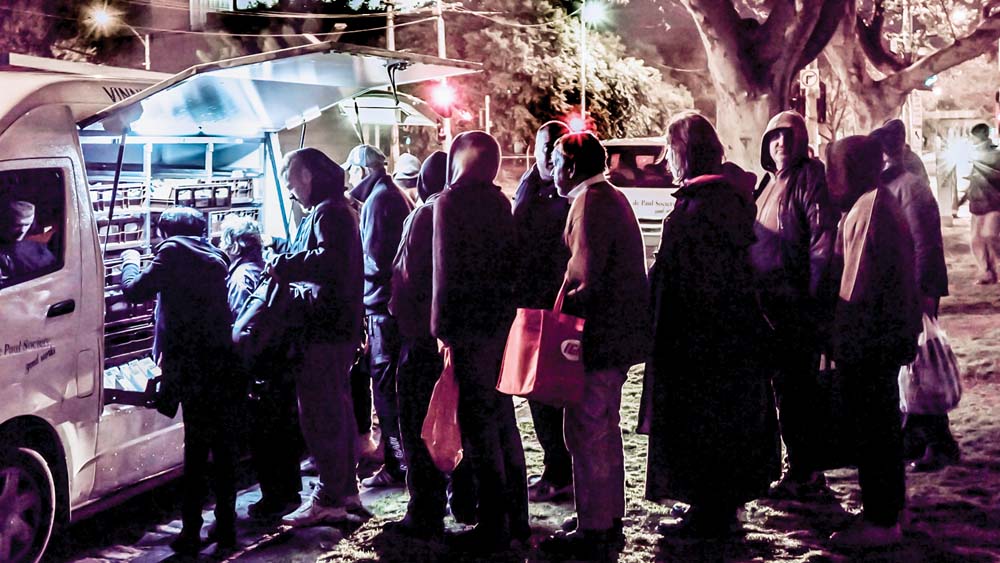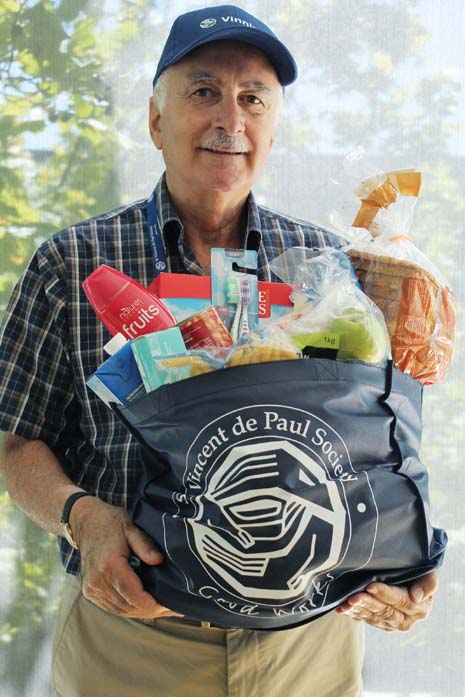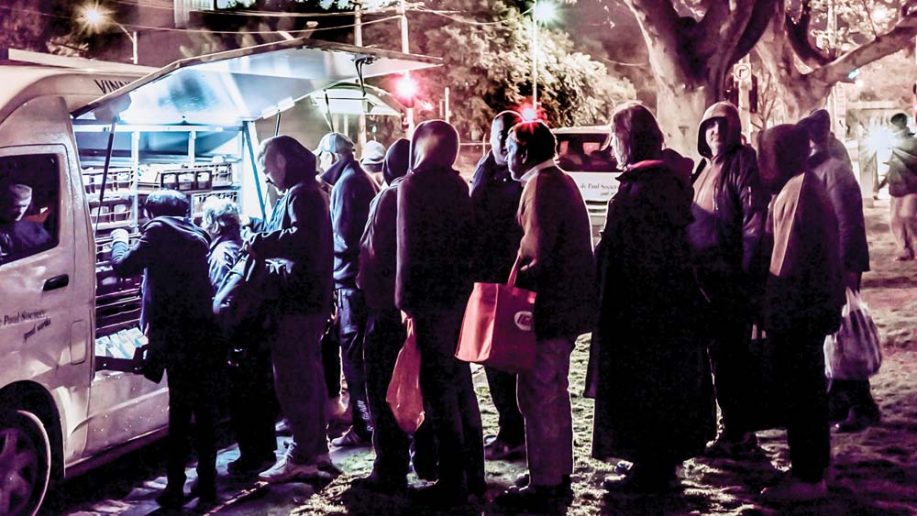THE St Vincent de Paul Society – an international organisation of the Catholic Church – was formed to help the poor in Paris, France in 1833. Unfortunately, as BARRY MORRIS discovered, the organisation’s services are needed as much in Frankston and on the Mornington Peninsula today as they were in the 1800s.

The desperate are struggling
IT’S curious what can happen when we reach out to help a fellow human being in need.
Two St Vincent de Paul Society workers visited a woman in a freezing government-owned one-bedroom unit that she couldn’t afford to heat.
On giving her some blankets, she took them in her arms and held them to her face.
She enjoyed the soft luxury of the blankets, kissing and hugging them, and then burst into tears.
“It broke my heart,” one of the Vinnies workers, Herbert Portanier, said.
Mr Portanier migrated to Australia in 1979 and, after arriving in Melbourne, went on to become a successful businessman.
He founded his own freight company, in a tough, competitive industry.
When he retired at 61, he joined the St Vincent de Paul Society so that he could give back to his local community.
His managerial skills saw him become president of the Southern Central Council region which encompasses Berwick, Dandenong, Hampton, Mentone, Frankston and the Mornington Peninsula.
This “no-nonsense” former businessman can tell many similar stories about people who are struggling.
There were people like John, who had just arrived in Melbourne from the country and was living in a rooming house.
It was a large house where all rooms had been divided into smaller ones to make up 10 single bedrooms and two double bedrooms.
The business worked on the principle that the more tenants they could squeeze in, the bigger the profits.
The lounge room was divided into three and the backyard porch was a makeshift TV room, with its acrylic glass roof making it icy cold in winter.
The tenants shared two showers and two toilets.
The weekly rent was $240 for a single and $380 for a double.
For people like John, unable to afford a bond and with no references, housing options are limited.
When Mr Portanier and John met, John was wearing thongs, a shirt two sizes too small, a pair of pants one size too big, held up by a worn out belt. On his trip from the country to the city, he had fallen asleep and his bag, with all his possessions, was stolen.
A Vinnies shop provided him with food and clothes.
Rooming houses profit from the poor
THE poorest of the poor can end up living in rooming houses on the Mornington Peninsula and in Frankston.
Many residents would be unaware of their existence.
Owners of three or four-bedroom houses can often get $500-$600 a week rent. But by dividing the house into 10 rooms, they end up with one house with 10 tenants, one kitchen, one bathroom and one shower.
They can charge $220 a week a person. Rent for a double room can be as high as $370 a week.
This results in them receiving $2200 a week compared to $500-$600.
“I have been to these rooming houses in the middle of winter and the landlord has cut off the central heating, as well as the gas, and it’s absolutely freezing,” St Vincent de Paul Society volunteer Herbert Portanier says. “I had a situation last winter where a woman was warming her hands warm over a sandwich maker.”
Becoming homeless ‘not chosen’

HOMELESSNESS is not something people choose – sometimes they are simply unlucky and fall on hard times.
St Vincent de Paul Society executive and volunteer Herbert Portanier regularly meets people experiencing housing insecurity.
“All it takes is for the primary income earner to lose their job,” Mr Portanier said.
“This can often mean relying on Newstart or other welfare benefits to pay for the basics.”
If a family or individual were renting, government assistance generally was not enough to pay for the basics – especially rent, which was on the rise.
“The stress this puts on confidence and relationships is immense and, in extreme circumstances, can lead to homelessness,” Mr Portanier said.
Other examples were people who had been in traffic accidents or injured in the workplace.
A sudden loss of income could lead to seeking temporary accommodation, such as couch surfing with friends, or living in a rooming house, a notoriously expensive and tough environment.
“If someone is working and they lose their job, the current Newstart weekly payment for a single person is about $272 [a week], plus some rent assistance of about $67,” Mr Portanier said:.
“If they’re paying $220 in rent, then they will have $17 a day to pay for everything else – food, clothing, transport and more.”
This was why many people did without secure accommodation and ended up sleeping rough.
Mr Portanier agreed that they were the hidden poor: “Unless you look, you don’t see them.”
Services stretched to limit
THE rising cost of living and inadequacy of welfare payments – particularly Newstart – are a concern for the St Vincent de Paul Society.
Vinnies services are being stretched across the state, including the Mornington Peninsula, with people suffering week after week.
In the past year, Vinnies in Victoria has seen a 40 per cent increase in requests for help.
“In one month alone on the peninsula we make 800 visits,” Vinnies official Herbert Portanier said.
“In total we are seeing about 2000 adults and children.
“We are giving about $77,000 worth of food vouchers and assistance with furniture and rent.
“This is month, after month, after month.
“People just can’t cope any more. They are hungry. The most common request is for food vouchers, but they’re juggling multiple expenses – rent, utilities, education and more.
“The problem will get bigger and bigger unless we say, ‘Right, we’re going to increase welfare assistance’. It can’t keep on going this way.
“If a family owns a house, and they are pensioners, they will just manage to pay the bills. But if a single parent receives just over $380 a week in parenting payments, they simply couldn’t survive if they’re paying $350 a week in rent, even if you factor in the Family Tax Benefit.
“There is a cry out there for help.”
Mr Portanier is also concerned that St Vincent de Paul Society members are ageing, with an average age of 65.
“Vinnies can always benefit from extra volunteers to help make an impact on the community,” he said.
First published in the Southern Peninsula News – 7 August 2018




